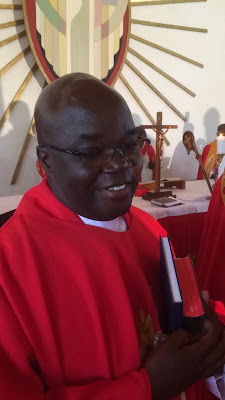Crafting Lutheran Pastors in Tanzania. Perceptions of Theological Education and Formation in the Evangelical Lutheran Church in Tanzania
It was an
interesting two hours conversation, mainly between the respondent (Johannes)
and the opponent (Prof. Knut Holter, University of Stavanger).
The
opponent began by giving an overview of the thesis and made sure that the
respondent accepted his rendering. Johannes did and said:
It is obvious that we have read the same book.
After that
the opponent said he would now change attitude. He revealed that he was equipped
with a sledgehammer. He was prepared to use it if he found any cracks in the
reasoning in the thesis. He could even consider making cracks in the
construction himself. Of course the respondent and the audience laughed but I
could also feel a sense of anxiety in the room.
 |
| After almost 1½ hour the opponent stood up and concluded that the thesis in deed was a good piece of academic work. |
After almost
one and a half hour we were, however, relieved. Johannes was calm and relaxed throughout
the disputation and gave good answers to the opponent. Johannes also admitted
that he could have done things differently. (As a respondent you must show some
humility).
Let me
point out a few things that struck me. Johannes has conducted interviews with
lecturers at Tumaini University Makumira, where Lutheran Pastors in Tanzania get
there education. He has also interviewed a number of Bishops of the Evangelical
Lutheran Church in Tanzania. In order to get access to these informants he has
made use of his contacts. He has met them both as a scholar and as a Lutheran
Pastor from Church of Sweden. It has been important to build good relationships
with them. This could however have interfered with his ambition to act
critically, as a scholar. On the other hand, if he had not done this, he might
have come across problems in even getting to talk with them. The opponent and
some of the members of the committee, who ultimately would decide whether or
not the thesis would be approved, raised some concern on this point. Johannes
should have asked more critical questions and not relied on the informants so
much. One of the committee members, Professor Eila Helander, University of Helsinki,
also asked about the set of questions that Johannes had used in the interviews.
They were nowhere to find in the thesis. Of course she was right, it would have
been interesting to see them.
Another
committee member, Professor Joram Tarusarira, University of Groningen, asked
about the role of traditional African religion in the context of formation of
Pastors. This could also have been interesting to find out. My remaining
question is whether or not Johannes had asked the informants of this
connection. It was obvious that they did not take up this issue on their own. Traditional
belief systems probably play an important role. But again, how can you as a
scholar get information about this if the informants don’t speak about it themselves?
(I need to admit that I have no experience when it comes to interviews. I have mainly
worked with written texts.)
What about
the Pentecostals? If I understood the conversation correctly this is one of the
finding in the thesis. Those who are responsible for the formation of Pastors
in the Evangelical Lutheran Church in Tanzania regard Pentecostalism as a
threat. They want to safeguard the Lutheran identity from to many charismatic influence.
These influences also come from within the Church. Johannes states:
This study shows that the informants are constantly negotiating and wrestling with the influx of ideas and practices from the ‘inside’, i.e. from dynamic Lutheran pastors in charge of charismatic and flourishing congregations across the country (Zeiler 2018:193).
To me it is
clear that we face similar challenges at the Church of Sweden Institute for
Pastoral Education. There is a conversation about our own chapel life and our
different forms of worship, such as folk church inspired, low-church, high-church,
charismatic and many other forms. If I as a teacher find that students prefer a
more charismatic worshipping style, do I welcome that? Do I try to “craft” that
student in a different way? Does our new Altar Book allow a charismatic liturgy
and accommodate Pentecostal influences?
Johannes is
coming to us in a few weeks’ time as a guest lecturer. He is going to teach
about Ecumenism. I think I will ask some of these questions to him during that
lecture.







